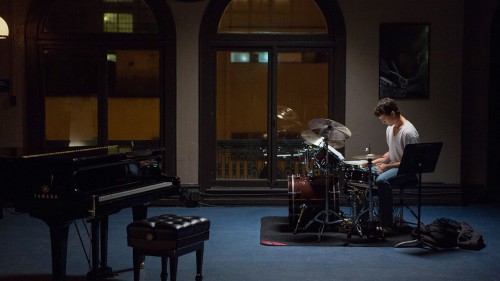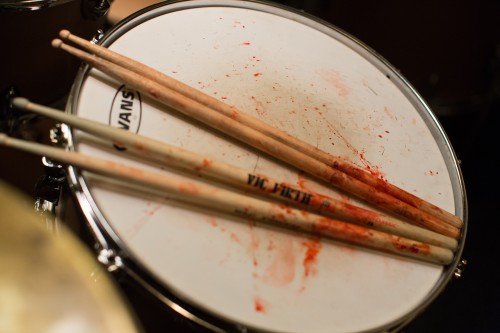
[Mild spoilers follow.] As a writer, I’ve found, you’re always searching for material. A friend’s talking to you about a bad breakup, years of religious doubt and self-recrimination for doubting, a car wreck, DUI, or lost job. Suddenly, once an insight seems to hit you – or even a situation with a certain intellectual appeal – the ideas become all, and their textures, contexts, and the unfortunate people living in them become pared back, leaving you with what feels like the beginnings of a great article, essay, even poem. The real world fades away, and all you’re left with, all you choose to take with you, is the insight, another breakthrough – another step towards elusive success.
Film critics can rest in the search for a while, because if Damien Chazelle’s directorial debut, Whiplash, is anything, it’s catnip for critics. A precocious student at the fictional Shaffer Conservatory in Manhattan, a jazz drummer, has found his passion and an obsessive teacher to drive it forward, and everything else fades away. In one of the opening shots, the camera tracks down the streets of nighttime New York, stopping to linger on a few still-lit storefronts, and then it too recedes. Tracking shots, dollying in and out, establishing shots, and other ‘technique’ is pushed away in favor of rapid transitions between various close-ups, personal, singleminded, and claustrophobic. The characters, most of whom are viciously pursuing musical perfection, don’t know quite how they got here, and neither does the viewer: we are where we are, with the talents, time, and most importantly, desires which we’ve been given, and we’re stuck there. There’s no way out, no exit, least of all from ambition and the quest for perfection.
The film’s effective restraint goes beyond its deceptively simple camerawork. The student’s – Andrew’s – parents are divorced, but grief is a theme only insofar as it propels him into the world of musical perfectionism. There’s romance, but we only really learn Andrew’s been officially dating at the moment he breaks up with her. The children of family friends, following alternative career paths, are brought in to see Andrew dismiss them (“You think you’re better than us?” “You catch on quick”). The draconian teacher, Terence, sobs over a former student who died, named Sean, playing one of his tapes to the class in memoriam and praising his trumpet virtuosity. Everything is about music.
Whiplash uses its widescreen beautifully: faces are sometimes cut partially or fully at the top of the frame, suggesting that instrumentation is all that matters; the characters are seen only for what they can accomplish. At the sides, emptiness or failure threatens: blank space next to the drum kit implies there’s nothing to fall back on; other times, you see the alternate drummer scanning the music, hoping for failure, ready to jump in once the slightest mistake consigns the lead to mediocrity, forever. Andrew walks off the screen in a couple moments of failure, but at family dinner, he walks off too, failing to fit in. And the camera lingers in places, showing the fullness of the life which Andrew just wasn’t quite good enough for – and the seeming peace of other characters brings us into Andrew’s delusion that he is the only one on the verge of failure, and everyone else is safe.
Andrew’s ambition, and the ever-present tension between success and failure, drives the film. And there’s a deep sense of devotion from everyone to their music. I’m reminded of a line from Sarah Coakley’s latest book, when she recounts interviewing a charismatic English plumber. Proudly, he tells her of his speaking in tongues at work: “There are some very prayerfully laid pipes in this area”. But Andrew is strangely silent on the job; just as he can’t quite communicate his astounding musical success to normal people at family dinner, he can’t really articulate his own passion for jazz. In one scene, after being predictably devastated by the pressure, he watches home videos of his drumming as a kid. All smiles and excitement then, pure and bare determination now. The grace of the movie is that the music speaks for him, the songs carefully chosen to soundtrack a frenetic, claustrophobic, but also gorgeous endeavor. In the closing scene, after playing a concert at the direction of his abusive mentor, the same thing happens: his pain hasn’t gone and the blood still drips at stages on the drums, slow-motion camerawork harrowing the viewer with the omnipresent threat of failure. One falter – that’s all it takes, and he’s humiliated. Nothing less than perfection will do.
Still in agony, he somehow plays the song correctly, for the first time. The tempo has been outpacing him all movie, but he finally, for a moment, catches up to perfection’s demands. Then the brass joins in for the final note, the joining of everyone else in approval and harmony with what he’s accomplished. The screen cuts out to black: it’s likely he’ll fail again, likely he’ll suffer more abuse from Fletcher, likely the whole damned cycle of achievement, investment, failure, self-recrimination, and despair will continue. But for just one moment, he’s there – seemingly not playing the music prayerfully or even affectionately, still years and years from his joyful amateur childhood – but over the song of obsessive perfectionism, the music expresses something beyond his compulsive ambition. That moment’s not a tidy one, but it certainly is hopeful.
Hopeful, that is, within the movie’s deliberately narrow confines: jazz musicianship. Terence’s pressure was felt as an evil mainly because it paralyzed Andrew’s ability by making him too self-conscious to play well. Thank God the movie’s scope actually is tiny, because even that last moment of joy feels strangely stifling. We want development of his relationship with his father, we want to know he won’t commit suicide like other high-pressure musicians have, and we want romantic development. But the message is clear: you can’t have it all, either onscreen or in life. Success isolates you and takes you to that suffocating place where even the ultimate triumph feels strangely inconclusive – things still aren’t done in the war for perfection, and they haven’t more than barely started with regard to romance or friendship. Among Whiplash’s many achievements, perhaps the greatest is that musical perfection doesn’t feel like an endpoint.
The songs, for Andrew, have no real originality or texture beyond the notes they demand he copy, denuded scales and theories. As he listens, he drums with his fingers; they’re pure rhythm and little to no mood. In a revealing scene, Andrew plays wonderfully when Terence asks him to relax, because he feels the totality of the music, it seems. But when he becomes tunnel-vision focused on achievement, which is what Terence’s pressure does to him, it’s pure technique, little real engagement. Familiarity with the paralyzing effects of demand is absolutely central to appreciating the movie (one reason, incidentally, why Richard Brody misreads the film, taking the characters seriously while the film’s formal properties are constantly, deliberately undercutting them). Whiplash does not glorify this slavish adherence to the Law of Perfection, but takes it to its extreme in an act of dark satire. The music is mere material, little more than a means to perfection for Andrew, and relationships, family, and friends all fade out in pursuit of his goal. That the music becomes more than this to the viewer is one of the film’s few uplifts.
As a cultural parable, the message is clear: this is what the strained and fleeting exuberance of a life devoted to pursuit of accomplishment and prestige looks like; you don’t know how you got here, but this desire for utter perfection is yours to manage and cope with. Your hands are bloody with effort, but you’re still just barely dragging behind tempo. Everyone now has so many opportunities to pursue passion and talent to the utmost, but is perfection worth the price? In Chazelle’s world, we’re not even given time or space to think what it is we’re missing out on – get back to work, rehearsal’s in two hours and you better be ready. A single missed note, and you’re out of here: we can only hope that the world offscreen holds more in it than the gunners can see.

COMMENTS
6 responses to “Damien Chazelle’s Whiplash: A Parable of Stifling Perfection”
Leave a Reply















Thanks, Will. Sounds like a powerful film. But it’s a little ironic that jazz is the, er, instrument for examining perfectionism, since improvisation and individual creativity are such a key elements of the music, and this guy’s at an elite school (a Manhattan conservatory). To even be admitted, he’d know how to keep the tempo, and at his level, there would be more right than wrong ways to play with it. A good teacher – a teacher at a conservatory – would know and teach that. Or so I would think.
I can’t conceive of the teacher portrayed in the trailer teaching jazz anywhere. Check out the great jazz drummer Peter Erskine’s take on the film:
http://www.kcet.org/arts/artbound/counties/los-angeles/drummer-peter-erskine-on-whiplash-film.html
As a music major I can attest to the extreme pressure of performance, the teacher”s ego quite involved. As for jazz it works a bit differently. It works in community tossing back and forth, listening for the very moment to enter the conversation while always respecting the group effort. Ken you are correct improv is never perfection but imperfection moving into perfection and into community.